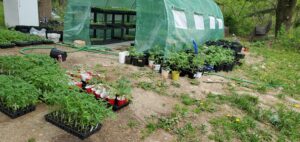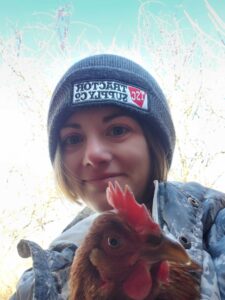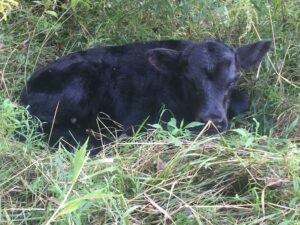Farmer Veterans: Starting at Square One
Military service generates multiple transitions points for veterans, and these experiences can support a veteran’s transition into agriculture.
The life transition into the military begins the day individuals raise their right hand. On that day, a person becomes one of a small percentage of Americans, who enter military service. Not to sound dramatic but just to state the truth, it is the day your life changes forever. A servicemember may transition into a new job every 12-24 months, pack their belongings to transition to a new duty station every 2-4 years, or leave the safety of their home to deploy across the globe for an undetermined amount of time. Each time, starting from square one; each time going into that new job, position, or location with more knowledge and skills than the time before.

Morganti Farm LLC grow their own vegetable starts from seed. Courtesy of Sara Morganti
Farming may be considered a far stretch from a veteran’s past or current life experiences, and the decision to transition into farming may feel complex and daunting. Yet if veterans were to remember back what it felt like that day they raised their right hand, swearing “to bear true faith and allegiance to the same…” and then reflected upon the endless trainings and experiences that prepared them to step out of their comfort zone and act and/or lead under conditions and circumstances that could literally blow up in their face, then farming may not feel so complex nor daunting. Still, for many veterans without a farming background, it does mean once again having to start from square one.
The Cornell Small Farms Program (CSFP) understands this concept of starting a farm or agricultural business from square one so well that they named a course after it, literally calling it “Starting at Square One”. This course, available to anyone considering starting an agricultural business, provides a steppingstone for an individual’s transition into farming. “The BF 101: Starting at Square One” online course emerged from my own experiences starting a farm from scratch, as someone who did not come from a farming background. We cover a lot of ground in the course, from getting clear on your resources and vision to evaluating land for farming, choosing enterprises, and financing start-up. We designed a second course to follow BF 101 that brings in additional essential explorations, called “BF 102: Exploring Markets and Profits.” describes Erica Freney, Small Farm Program’s online course coordinator.
In fall of 2021 NYS veterans were offered free enrollment into this course, along with the option to attend veteran-only cohort sessions. When taking a CSFP course, an individual may be in the classroom with people from all over the United States and even across the globe. Additional veteran cohort learning sessions offer the opportunity for veterans to collaborate, exposing them to new careers, opinions, experiences, ideas, and facilitate network and relationship building.

Sara with one of her famous layers “Greta.” Courtesy of Sara Morganti
Army veteran, Sara Morganti and Marine veteran, Joe Morganti, started Morganti Farm, LLC in Newfield, NY to create an income stream from home. Sara enjoys the challenge of growing plants, raising animals and learning how to be more efficient and productive. Joe enjoys being outdoors, and he feels that farming provides a grounding process for him. Sara and Joe currently manage just under 14 acres. Together they start their day feeding the animals, then focus on various farm chores, such as seeding, transplanting, weeding, or harvesting depending on the time of year. Typical of many farm families with off-farm jobs, Sara attends to farm work until she goes to her off-farm job, while Joe works later in the afternoon until dark.
Sara and Joe took the CSFP online course, Starting at Square One, and attended the veteran-only cohort sessions. At that time, Sara and Joe were raising meat rabbits and growing vegetables. “In 2022 we added a half-acre of fruit trees and in 2023 plan to expand our vegetable crops to two acres, in addition to raising 100 laying hens and 150 meat chickens.” They currently raise two pigs for personal consumption but intend to research raising pigs on pasture as part of their farm business.
Sara and Joe have taken other CSFP online courses, attended Farm Ops virtual and in-person events for veterans, and constantly read to stay abreast of agricultural science topics and new research. They understand that when it comes to establishing a farm business, one shoe does not fit all. “Starting was a struggle. Going through the process of figuring out what works and doesn’t work for us was a pretty lengthy process,” states Sara. The Starting at Square One course provides a menu of weekly webinars, relevant readings, homework assignments, and discussion forums to share reflections and questions. “The webinars usually feature successful farmers talking about how they got started and offering advice learned from hard experience. This combination of listening, reading, then applying concepts to one’s own situation helps people absorb the course content”, states Erica.
Starting a farm business takes more than just understanding how to produce salable items, farmers must also maintain their equipment and wisely manage their profits to keep the farm business viable. “Purchasing the equipment we needed was super expensive and was compounded by having a lot of infrastructure repairs on both the farm and our house. We really wanted to do the right thing, but we have had to compromise to make it more affordable while we grow into what we want,” commented Joe.
Navy veteran, Lou Russell Jr. purchased his 26 acres farm in Galawy, NY in May 2021. “Although it came with very little equipment or infrastructure, it did come with two cows as part of the sales deal” stated Lou. “Now I’m up to seven. I love the hard work, the rewarding feeling that comes with it, and the feeling of freedom in that I’m raising my own food.” Lou decided to focus his farming efforts on the theme of “Farm Fresh Proteins” and his current product line includes, beef, pasture raised pork, free range chickens, eggs, and recently added heirloom dry beans.
Lou often talks about how he did not come into farming with an agricultural background, “I fell in love over the years going to county fairs and visiting farms wherever I was stationed for various duty assignments. I just decided to get started and would figure it out along the way. The Farm Ops project and the veteran cohorts have helped tremendously. Then I joined the Farmers Veterans Coalition and of course received support from other local farms as well. I made a lot of connections and have learned continually from my newfound connections at the local Farmers Market.”
Lou applied for and received scholarships for the CSFP Starting at Square One and Getting Started with Pasture Pigs online courses with veteran only cohort session through the Farm Ops project. “Running any business today is difficult, and finding the time, resources, and people to mentor you through the process is one of the most important seeds for putting down a supportive root system and growth!”, Lou states. The cohort sessions allowed Lou to interact with 23 other veterans also taking the Starting at Square One or Pasture Pigs online courses and five NYS farmer veterans currently raising pigs or operating other successful farm businesses. “If it were not for the veteran cohorts, there is absolutely no way my farm would be past even a germinated seeds’ phase of growth. I am so grateful to my brothers and sisters in the cohorts!” Lou said. During a cohort session Lou was introduced to the concept of food aggregation as a means of providing fresh farm products to communities where farm products are difficult to obtain. Although still developing his business model, Lou now works with local and regional farmers, to include farmer veterans he met during cohort sessions, to provide eggs, chicken, and pork to his local market.

Calf, Zorro, the black bull calf was the first born on Jireh Organic Farms and Livestock of NY farm last August. Courtesy of Lou Russell
Lou has an off-farm job in addition to his farming business, Jireh Organic Farms & Livestock of NY. He starts his day with what he calls “computer chores”, a combination of office work for his employer and tasks to support and run the farm business, such as purchases, social media, or whatever seems urgent at the time. He then transitions to outdoor farm chores, such as gathering eggs for packing and feeding the cows. “We all have to work for someone and take orders, and veterans get a good amount of that while in the service. I always wanted to own land, and now that I’m farming, I take orders from customers to provide them farm fresh food, and my customers really appreciate what farmers do for them, which makes it all the more rewarding,” commented Lou.
Lou compares his farming learning curve to “drinking from a fire hydrant”. “Startup has been slow and with many frustrations, but I’ve learned to have patience. It’s sort of like a deployment, you train, train, train and when the time comes, you just go, whether you think you are ready or not; see you in 6 – 12 months! The biggest challenges are easy to guess, always more things to do and learn than you have time or resources. You just have move slow and steady, and when you look back you won’t believe where you are compared to where you were when you started! As for the progress of my farm, well if not for Cornell Small Farms, Farm Ops, and the veteran cohort, I can surely say I would not be selling ‘Farm Fresh Eggs’ or have the Homegrown by Heroes Membership. The cohort for me is the purest form of support in a judgmental-free zone; we can only succeed together!”

